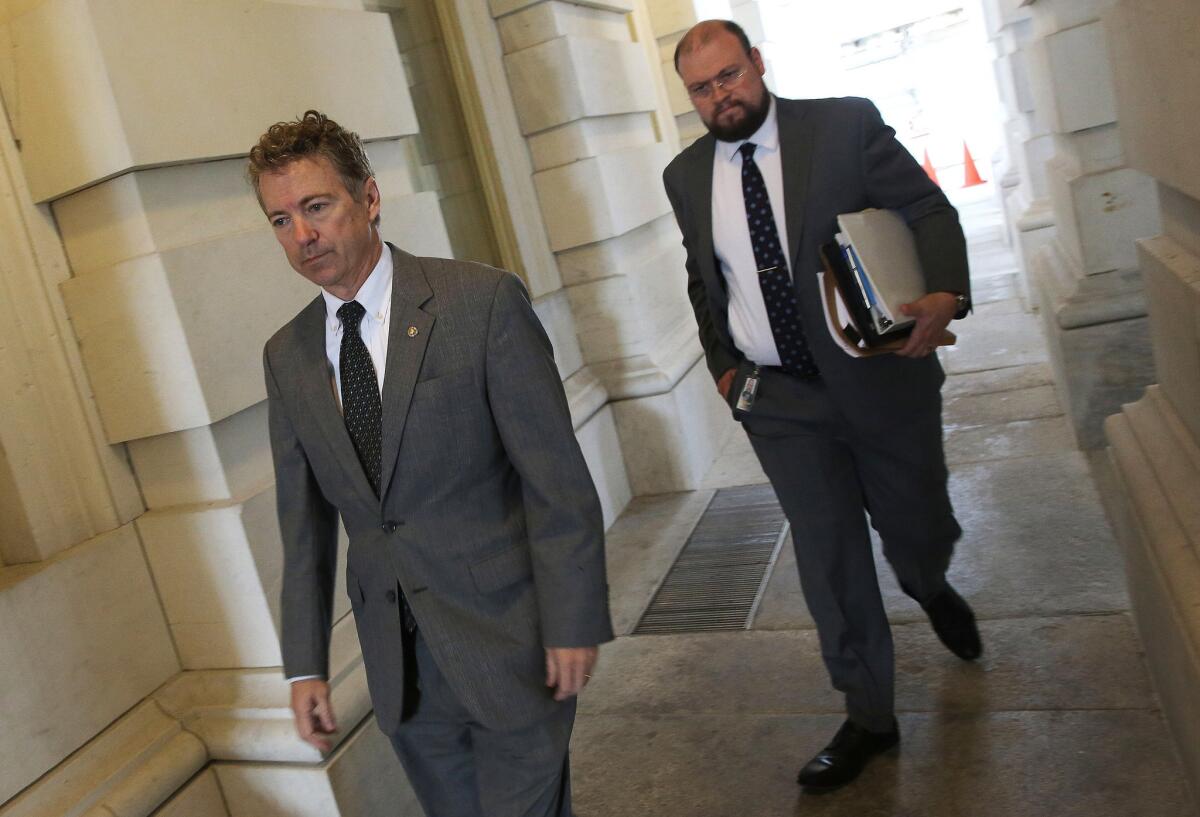Senate OKs budget and debt deal, sends measure to Obama

Sen. Rand Paul enters the Capitol before speaking on the Senate floor on Oct. 29.
reporting from WASHINGTON — Congress early Friday sent President Obama an ambitious budget and debt measure that averts a catastrophic national default and sets spending priorities for the next two years.
The Senate voted 64-35 to approve the bill just after midnight PDT, with Democrats and Republican defense hawks uniting to overcome opposition from GOP presidential candidates Rand Paul of Kentucky and Ted Cruz of Texas, both members of the body.
Obama had negotiated the accord with Republican and Democratic leaders who were intent on steering Congress away from the brinkmanship and shutdown threats that have haunted lawmakers for years. Former House Speaker John A. Boehner felt a particular urgency to get the legislation finished before leaving Congress, while many lawmakers wanted the issue resolved as they look ahead to presidential and congressional elections next year.
The opposition was strong in the Senate, and Paul, a Kentucky Republican, left the presidential campaign trail and returned to the Capitol to criticize the deal as excessive Washington spending.
In an hourlong speech that delayed the start of the final vote, Paul said Congress is “bad with money.” He railed against increases in defense dollars supported by Republicans and domestic programs supported by Democrats.
“These are the two parties getting together in an unholy alliance and spending us into oblivion,” Paul said.
Cruz, another Republican presidential candidate, canceled campaign events in Nevada to return to Washington for the votes. Speaking on the Senate floor late Thursday, he said the Republican majorities had given Obama a “diamond-encrusted, glow-in-the-dark Amex card” for government spending.
“It’s a pretty nifty card,” Cruz said. “You don’t have to pay for it, you get to spend it and it’s somebody else’s problem.”
The agreement would raise the government debt ceiling until March 2017, removing the threat of an unprecedented national default just days from now. At the same time, it would set the budget of the government through the 2016 and 2017 fiscal years and ease punishing spending caps by providing $80 billion more for military and domestic programs, paid for with a hodgepodge of spending cuts and revenue increases touching areas from tax compliance to spectrum auctions.
The deal would also avert a looming shortfall in the Social Security disability trust fund that threatened to slash benefits, and head off an unprecedented increase in Medicare premiums for outpatient care for about 15 million beneficiaries.
The promise of more money for the military ensured support from defense hawks such as Sen. John McCain (R-Ariz.), chairman of the Armed Services Committee, while additional funds for domestic programs pleased Democrats.
Obama and Democratic allies such as House Minority Leader Nancy Pelosi of San Francisco were big winners in the talks, but GOP leaders benefited as well, clearing away political land mines confronting the party on the eve of 2016 campaigns to win back the White House and maintain their grip on the Senate.
The measure leaves a clean slate for new Speaker Paul Ryan (R-Wis.) as he begins his leadership of the House.
Obama had repeatedly said he would not negotiate budget concessions in exchange for increasing the debt limit, though he did agree to package the debt and budget provisions.
“I am as frustrated by the refusal of this administration to even engage on this [debt limit] issue,” said Finance Committee Chairman Orrin Hatch (R-Utah). “However, the president’s refusal to be reasonable and do his job when it comes to our debt is no excuse for Congress failing to do its job and prevent a default.”
The budget relief will lift caps on the appropriated spending passed by Congress each year by $50 billion in 2016 and $30 billion in 2017, evenly divided between defense and domestic programs. An additional $16 billion or so would come each year in the form of inflated war spending, evenly split between the Defense and State departments.
The appropriations committees will have to write legislation to reflect the spending, and they face a Dec. 11 deadline to get that done.
The cuts include curbs on Medicare payments for outpatient services provided by certain hospitals and an extension of a 2-percentage-point cut in Medicare payments to doctors through the end of a 10-year budget. There’s also a drawdown from the Strategic Petroleum Reserve, and savings reaped from a Justice Department fund for crime victims that involves assets seized from criminals.
ALSO
All the money in the world may not save Jeb Bush’s campaign
Hillary Clinton’s good week puts her back where she started
Republican debate: Candidates attack one another and the media
More to Read
Sign up for Essential California
The most important California stories and recommendations in your inbox every morning.
You may occasionally receive promotional content from the Los Angeles Times.










